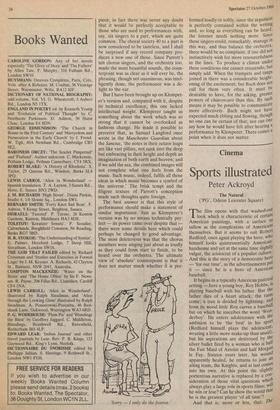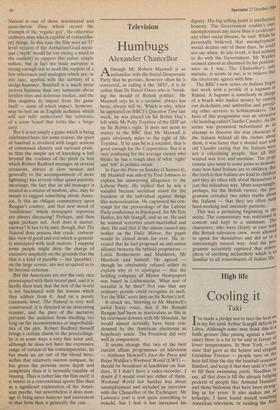Cinema
Sports illustrated
Peter Ackroyd
The Natural ('PG', Odeon Leicester Square)
The film opens with that washed-out look which is characteristic of certain American paintings, with a surface as sallow as the complexions of Americans themselves. But it seems to suit Robert Redford, once again playing the hero, who himself looks quintessentially American: handsome and yet at the same time slightly vulgar, the aristocrat of a populist culture. _ And this is the story of a democratic hero — 'for our time', as the advertisements put it — since he is a hero of American baseball. It begins in a typically American pastoral setting — here a young boy, Roy Hobbs, is playing baseball with his father. But the father dies of a heart attack; the rains come; a tree is divided by lightning, and from its wood little Roy carves a baseball bat on which he inscribes the word `Won" derboy'. He enters adolescence with the ambition to be 'the best' in his sport (Redford himself plays the adolescent, wearing a little more make-up than usual), but his aspirations are destroyed by th,e, silver bullet fired by a woman who is half the Fair Maid of Astolat and half Morgan, le Fay. Sixteen years later, his wound apparently healed, he returns to join all ailing team, the Knights, and at last comes into his own. At this point the slightly portentous narrative is replaced by a con- sideration of those vital questions which always play a large role in sports films; will he win or lose? Can he show the world that he is the greatest player 'of all time'? And that is, more or less, that: The Natural is one of those sentimental and quasi-heroic films which record the triumph of the 'regular guy', the otherwise ordinary man who is capable of extraordin- ary things. In this case the film uses an '0' level version of the Arthurian/Grail mysti- que ('myth' would be too strong a word in the context) to support this rather simple notion, but in fact the basic narrative is strong enough not to need the support of a few references and analogies which are, in any case, applied with the subtlety of a sledge-hammer. Baseball is a much more serious business than any nonsense about fertility rites and dolorous strokes, and the film acquires its impact from the game itself — some of which impact, however, may be lost on an English audience which will not fully understand the subtleties of a score board that looks like a bingo card.
But it is not simply a game which is being celebrated here; for some reason, the sport of baseball is involved with larger notions of communal identity and national pride, so that the simple act of knocking a ball beyond the confines of the pitch (a feat which Robert Redford manages on several occasions, always in slow motion and generally to the accompaniment of more lightning) has several other quasi-patriotic meanings; the fact that an old manager is treated as a source of wisdom, also, may be meant to suggest something about Amer- ica. Is this an oblique commentary upon Reagan's country, and that new mood of 'confidence' which newspaper reporters are always discussing? Perhaps, and then again perhaps not. And does it matter, anyway? It has to be said, though, that The Natural does possess that crude, cartoon- like view of good and evil which is general- ly associated with such matters. I suppose some people might deny the charge of excessive simplicity on the grounds that the film is a kind of parable — but 'parables', on the large screen, are not so sacred as to be beyond criticism.
But the Americans are not the only race preoccupied with their recent past, and it is hardly their fault that the rest of the world is not fascinated with the lessons which they adduce from it. And on a purely cinematic level, The Natural is very well constructed: it is directed in an interesting manner, and the pace of the narrative prevents the audience from dwelling too long on the inconsistencies or improbabili- ties of the plot. Robert Redford himself brings a certain charm to the proceedings: he is in some ways a very fine actor and, although he does not have the expressive range of certain of his contemporaries, he has made an art out of the blond hero; within that relatively narrow compass, he has given the persona more depth and complexity than it is normally capable of bearing. Thus is rather like the film itself: it is better as a conventional sports film than as a significant exploration of the Amer- ican psyche, but nevertheless it does man- age to bring more humour and excitement to that form than is generally the case.



















































 Previous page
Previous page